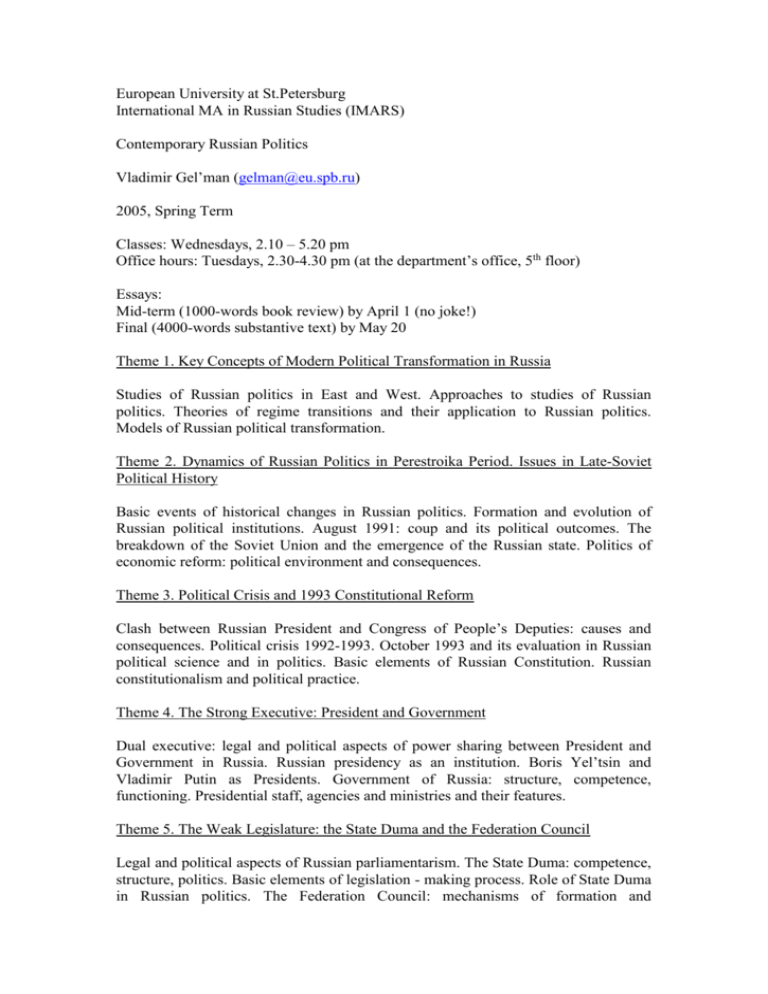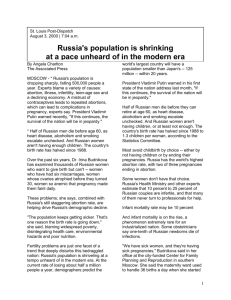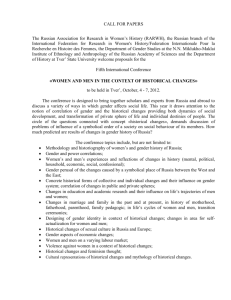CONTEMPORARY RUSSIAN POLITICS
advertisement

European University at St.Petersburg International MA in Russian Studies (IMARS) Contemporary Russian Politics Vladimir Gel’man (gelman@eu.spb.ru) 2005, Spring Term Classes: Wednesdays, 2.10 – 5.20 pm Office hours: Tuesdays, 2.30-4.30 pm (at the department’s office, 5th floor) Essays: Mid-term (1000-words book review) by April 1 (no joke!) Final (4000-words substantive text) by May 20 Theme 1. Key Concepts of Modern Political Transformation in Russia Studies of Russian politics in East and West. Approaches to studies of Russian politics. Theories of regime transitions and their application to Russian politics. Models of Russian political transformation. Theme 2. Dynamics of Russian Politics in Perestroika Period. Issues in Late-Soviet Political History Basic events of historical changes in Russian politics. Formation and evolution of Russian political institutions. August 1991: coup and its political outcomes. The breakdown of the Soviet Union and the emergence of the Russian state. Politics of economic reform: political environment and consequences. Theme 3. Political Crisis and 1993 Constitutional Reform Clash between Russian President and Congress of People’s Deputies: causes and consequences. Political crisis 1992-1993. October 1993 and its evaluation in Russian political science and in politics. Basic elements of Russian Constitution. Russian constitutionalism and political practice. Theme 4. The Strong Executive: President and Government Dual executive: legal and political aspects of power sharing between President and Government in Russia. Russian presidency as an institution. Boris Yel’tsin and Vladimir Putin as Presidents. Government of Russia: structure, competence, functioning. Presidential staff, agencies and ministries and their features. Theme 5. The Weak Legislature: the State Duma and the Federation Council Legal and political aspects of Russian parliamentarism. The State Duma: competence, structure, politics. Basic elements of legislation - making process. Role of State Duma in Russian politics. The Federation Council: mechanisms of formation and 2 functioning. Relations between chambers of parliament. Institutions of parliamentary control: Ombudsman, Accounting Chamber. Theme 6. The Rule of Law. Judicial Institutions in Russian Politics The general problems of rule of law and law enforcement in Russia. Courts, prosecutor’s office and other judicial institutions in Soviet period. Policy of judicial reform in Russia and its problems. Arbitration courts and jury. Constitutional Court in Russian politics: ‘case of Communist party’. Constitutional Court during 1993 political crisis. Practices of Constitutional Court after 1995. ‘Chechen case’. Russian courts and human rights: law and practice. Theme 7. Russia’s Electoral System Background of 1993 electoral reform. Key characteristics of electoral system. The impact of electoral formula. Features of electoral campaigns: nomination and status of candidates, political finance, role of media. Campaigns and their role in Russian politics. Theme 8. Russia’s Political Culture. Political Participation and Voting Behavior Continuity and change in Russian political culture. Forms of mass participation: political activism and protest movements. Voting behavior in Russia: theoretical frameworks and political realities. Absenteeism, negativism, protest voting. Electoral clientelism and electoral corruption. Theme 9. Political Parties in Russia The emergence of political movements during perestroika period. Formation of Russian political spectrum. The dynamics of party system: impacts of institutions and electoral behavior. Parties in parliament and outside. Classifications of Russian parties, their basic characteristics. Theme 10. Interest Groups in Russian Politics Concepts of interest groups of Soviet period. Theory of ‘bureaucratic market’ and its evolution. Transformation of organized interest groups in Russian politics. Key sectoral interest groups: agriculture, fuel and energy, military-industrial complex. New business and its influence in Russian politics: the rise and fall of “oligarchs”. Unions in Soviet and Russian politics. Labor movement and its problems. Is there a Russian version of corporatism? Theme 11. Transformation of Political Elites in Russia Concepts of political elites of Soviet period. The shift of vertical mobility of political elites in end 1980th - early 1990th. New and old elite groups and transformation of elite in post-Soviet period. Modern concepts of Russian political elites: political capitalism, generation changes, clientelist models. The ‘Party of power’ and problems of elite unity. 3 Theme 12. Russian Federalism: Rent-Seeking, Asymmetry and Practices Territorial-state dimension in USSR and Russia. Federal Treaty and its role in Russian politics. Constitutional federalism in Russia. Treaties between Center and regions and their political consequences. Fiscal federalism and federal budget. Federal reform under Putin: design and outcomes. Theme 13. Regions and Localities in Russian Politics Transformation of regional political institutions in 1990th. Constitutions and Charters of subject units of the Russian Federation. Regional institutions: legislative-executive relations. Actors and factors of regional politics. Influence of regional elites on Russian politics: institutions and informal mechanisms. Background of Russian local government. Practices of zemstvo. Soviet municipal school of 1920th. Soviet local government in 1930-1980th. Local government reforms in 1990th and their political consequences. Regional features of local government. Local government and ethnic minorities in Russia. Theme 14. Prospects for Russian Political Transformation: Domestic and Comparative Perspectives The lecture and seminar focused on analysis of political dynamics as well as prospects of political development in post-Yeltsin’s Russia in a comparative perspective. 4 Reading list * -- EUSP library (reserve collection) ** -- reader Core textbooks * Z.Barany, R.Moser (eds.), Russian Politics: Challenges of Democratization Cambridge: Cambridge University Press, 2001. * A.Brown (ed.). Contemporary Russian Politics: A Reader. Oxford: Oxford University Press, 2001. * M.McFaul. Russia’s Unfinished Revolution: Political Change from Gorbachev to Putin. Ithaca, NY: Cornell University Press, 2001. * L.Shevtsova. Yeltsin’s Russia: Myths and Reality. Washington, DC: Carnegie Endowment for International Peace, 2003. * L.Shevtsova. Putin’s Russia. Washington, DC: Carnegie Endowment for International Peace, 2003. * D.Hespring (ed.) Putin’s Russia: Past Imperfect, Future Uncertain. Lanham, MD: Rowman and Littlefield, 2003. Theme 1. ** H.Balzer. Managed Pluralism: Vladimir Putin’s Emerging Regime. Post-Soviet Affairs, 2003, vol.19, N3. * A.Brown (ed.). Contemporary Russian Politics: A Reader. Oxford: Oxford University Press, 2001, ch.40. ** J.Hughes. Transition Models and Democratisation in Russia. M.Bowker, С.Ross (eds.) Russia After the Cold War. Harlow: Longman, 2000. ** M.McFaul. The Fourth Wave of Democracy and Dictatorship: Non-Cooperative Transitions in Post-Communist World. World Politics, 2002, vol.54, N2. Theme 2. ** A.Dallin. Causes of the Collapse of the USSR. Post-Soviet Affairs, 1992, vol.8, N4. ** J.Linz, A.Stepan. Problems of Democratic Transition and Consolidation. Southern Europe, South America, and Post-Communist Europe. Baltimore and London: Johns Hopkins University Press, 1996, ch.19. * M.McFaul, Russia’s Unfinished Revolution, pp.33-117 Theme 3 * M.McFaul, Russia’s Unfinished Revolution, pp.121-204. ** R.Sharlet. Russian Constitutional Crisis: Law and Politics under Yeltsin. PostSoviet Affairs, 1993, vol.9, N4. * L.Shevtsova. Yeltsin’s Russia: Myths and Reality. Washington, DC: Carnegie Endowment for International Peace, 2003, pp.31-78. ** L.Shevtsova. Parliament and Political Crisis in Russia, 1991-1993, in: J.Hahn (ed.). Democratization in Russia: the Development of Legislative Institutions. Armonk/London, M.E.Sharpe, 1996. 5 Themes 4-5. * A.Brown (ed.). Contemporary Russian Politics: A Reader. Oxford: Oxford University Press, 2001, chapters 6 (Huskey), 7 (Chaisty). ** T.Frye. A Politics of Institutional Choice: Post-Communist Presidencies. Comparative Political Studies, 1997, vol.30, N5. * R.Moser. Executive-Legislative Relations in Russia, 1991-1999, in Z.Barany, R.Moser (eds.), Russian Politics: Challenges of Democratization Cambridge: Cambridge University Press, 2001. ** T.Remington. The Evolution of Executive-Legislative Relations in Russia. Slavic Review, 2000, vol.59, N3. ** M.Shugart. Executive-Legislative Relations in Post-Communist Europe. Transition, 1996, vol.2, N25. Theme 6. * A.Brown (ed.). Contemporary Russian Politics: A Reader. Oxford: Oxford University Press, 2001, chapters 8 (Hendley). ** V.Gel’man. The Unrule of Law in the Making: The Politics of Informal InstitutionBuilding in Russia. Europe-Asia Studies, 2004, vol.56, N7. ** G.Smith (ed.). State-Building in Russia. The Yeltsin Legacy and the Challenge of the Future. Armonk, NY, and London: M.E.Shapre, 1999, chapter 5. ** W.Pomeranz. Judicial Review and the Russian Constitutional Court: The Chechen Case. Review of Central and East European Law, 1997, vol.23, N1. ** R.Sharlet. Putin and the Politics of Law in Russia. Post-Soviet Affairs, 2001, vol.17, N3. Theme 7. * A.Brown (ed.). Contemporary Russian Politics: A Reader. Oxford: Oxford University Press, 2001, chapter 11-13 (Brudny, Gel’man, Moser). * V.Gel’man, G.Golosov (eds.). Elections in Russia: 1993-1996. Berlin: edition Sigma, 1999. * M.McFaul, Russian Electoral Trends, in Z.Barany, R.Moser (eds.), Russian Politics: Challenges of Democratization Cambridge: Cambridge University Press, 2001. Theme 8. ** D.Bahry et al. Tolerance, Transition, and Support for Civil Liberties in Russia. Comparative Political Studies, 1997, vol.30, N5. * A.Brown (ed.). Contemporary Russian Politics: A Reader. Oxford: Oxford University Press, 2001, chapters 20 (Rose), 22 (Levada). * T.Colton, M.McFaul, Are Russians Undemocratic?, D.Hespring (ed.) Putin’s Russia: Past Imperfect, Future Uncertain. Lanham, MD: Rowman and Littlefield, 2003. Voting Behavior ** T.Colton. Economics and Voting in Russia. Post-Soviet Affairs, 1996, vol.12, N4. ** A.Miller et el. The Russian 1996 Presidential Election: Referendum on Democracy or a Personality Contest? Electoral Studies, 1998, vol.17, N2. ** R.Rose et al. Understanding Multi-Party Choice: The 1995 Duma Election. Europe-Asia Studies, 1997, vol.49, N5. 6 Theme 9. ** V.Gel’man. The Extinction of Political Opposition in Russia. PONARS Policy Memo, 2005, N340. ** G.Golosov. Political Parties in Regions of Russia: Democracy Unclaimed. Boulder, CO: Lynne Rienner, 2004. ** M.McFaul. Explaining Party Formation and Non-Formation in Russia. Comparative Political Studies, 2001, vol.34, N10. ** R.Smyth. Building State Capacity from the Inside Out: Parties of Power and the Success of the President’s Reform Agenda in Russia. Politics and Society, 2002, vol.30, N4. Theme 10. ** A.Barnes. Russia’s New Business Groups and State Power. Post-Soviet Affairs, 2003, vol.19, N2. * A.Brown (ed.). Contemporary Russian Politics: A Reader. Oxford: Oxford University Press, 2001, chapter 18 (Peregudov). ** T.Frye, Capture or Exchange? Business Lobbying in Russia, Europe-Asia Studies, 2002, vol.54, N7, pp.1017-1036. ** J.Hellman. Winner Takes All. World Politics, 1998, vol.50, N2. ** K.Hendley et al. Law, Relationships and Private Enforcement. Europe-Asia Studies, 2000, vol.52, N4. Theme 11. * A.Steen, V.Gel’man (eds.). Elites and Democratic Development in Russia. London: Routledge, 2003, ch.2, 3. ** O.Kryshtanovskaya, S.White. Putin’s Militocracy. Post-Soviet Affairs, 2003, vol.19, N4. ** D.Lane. Transition under Eltsin: The Nomenklatura and Political Elite Circulation. Political Studies, 1997, vol.45, N5. Theme 12. ** M.Hyde. Putin’s Federal Reforms and Their Implications for Presidential Power in Russia. Europe-Asia Studies, 2001, vol.53, N5. ** G.Lapidus. The Dynamics of Secession in the Russian Federation: Why Chechnya?, in: M.Alexseev (ed.). Centre-Periphery Conflict in Post-Soviet Russia. New York, St. Martin’s Press, 1999. ** A.Stepan. Russian Federalism in Comparative Perspective. Post-Soviet Affairs, 2000, vol.16, N2. * K.Stoner-Weiss, The Russian Central State in Crisis: Center and Periphery in PostSoviet Era, in: Z.Barany, R.Moser (eds.), Russian Politics: Challenges of Democratization Cambridge: Cambridge University Press, 2001. Theme 13. ** V.Gel’man. Sub-National Institutions in Contemporary Russia, in N.Robinson (ed.). Institutions and Political Change in Russia. London: Macmillan, 2000. * V.Gel’man, S.Ryzhenkov, M.Bire. Making and Breaking Democratic Transitions: the Comparative Politics of Russia’s Regions. Lanham, MD: Rowman and Littlefield, 2003. 7 * G.Golosov. Political Parties in Regions of Russia: Democracy Unclaimed. Boulder, CO: Lynne Rienner, 2004. * A.Evans, V.Gel’man (eds.), The Politics of Local Government in Russia. Lanham, MD: Rowman and Littlefield, 2004. Theme 14. * A.Brown (ed.) Contemporary Russian Politics, chapters 33-36 (Schmitter and Karl, Bunce) * S.Fish. Conclusion: Democracy and Russian Politics, in: Z.Barany, R.Moser (eds.), Russian Politics: Challenges of Democratization Cambridge: Cambridge University Press, 2001. ** S.Hanson. Leadership Succession in the Russian Federation: After 2008?, PONARS Policy Memo, 2002, N285. ** S.Hanson. Can Putin Rebuild the Russian State? PONARS Policy Papers, 2000, N148. * M.McFaul, Russia’s Unfinished Revolution, pp.309-371. Also – current issues of area studies journals: “Europe-Asia Studies”, “Transition”, “Post-Soviet Affairs”, “Slavic Review”, “Russian Review”, as well as comparative politics journals: “Comparative Politics”, “Comparative Political Studies”, “Political Studies”, “Journal of Democracy”.








